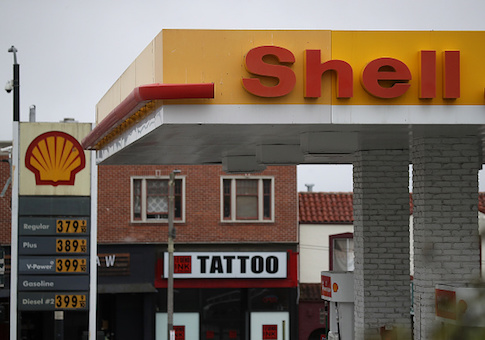Democrat Katie Hill, who is challenging incumbent Rep. Steve Knight (R, Calif.) in the most expensive California House race, said she doesn't support repealing the most recent state gas-tax increase because oil companies make extra profits when gas prices are high.
Hill was responding to a question during Thursday night's debate when the moderator asked her what her position is on Proposition 6, the state ballot initiative to repeal the most recent state gas-tax increase.
Instead of saying whether she would support the gas tax repeal, she blamed oil companies for the high gas prices and argued that they are backing the repeal campaign.
"One thing that I think we have to recognize is that the gas tax [increase this year] was 12 cents a gallon, and it was passed a year ago and since then, gas prices have gone up by more than a $1," she said. "12 cents and $1 don't quite match up. The rest of that increase has gone directly into the hands of big oil companies who are fighting for the 'yes on Prop 6 campaign?'"
"It's the oil companies who see those extra profits because they are not going to be reducing gas prices," she asserted.
The response left some Republicans scratching their heads. Oil company policies impact many states across the nation, including California, similarly while state legislatures control how much their state residents will pay extra in taxes.
Californians pay the second highest gas taxes in the country with 74 cents on each gallon of gas going to pay for state and federal taxes, according to the American Petroleum Institute.
Southern California gas prices this summer and early fall are their highest in three years after the latest gas tax was implemented in January. Prices have hovered around $3.87 in the Los Angeles area, nearly $1 more than the national average, reports the Auto Club of Southern California.
By 2021, many Californians will be paying close to $2 a gallon because of taxes, fees, and other government requirements.
In late August state Democratic leaders faced a mutiny by four of the party's congressional candidates who are opposing a recent increase in the California gas tax, which a majority of voters across the state opposed at the time, polls showed.
Democratic candidates Katie Porter in the 45th District, Josh Harder in the 10th District, Jessica Morse in 4th, and Ammar Campa-Najjar in the 50th all came out in support of Prop 6.
The initiative would repeal the state law, which passed last April with strong support from Gov. Jerry Brown. It raised the gas tax by 12 cents per gallon, boosted the diesel fuel tax by 20 cents per gallon and increased vehicle fees.
The new charges are expected to raise $5.4 billion ostensibly for road and transit projects, but Republican critics say Democratic lawmakers will divert the revenues to pay for the state's debt balance and for other Democratic priorities unrelated to roads and bridges.
Hill, however, has continued to oppose the Prop 6, which outside GOP groups have blasted her for. In September, the Congressional Leadership Fund, which is closely aligned with House GOP leaders, released an ad hitting Hill over the gas-tax issue.
"California already pays the highest gas taxes in the nation—Katie Hill thinks you don't pay enough," the ad said. "Katie Hill's campaign is backed by Sacramento liberals who raised the gas tax, and Katie Hill supports radical environmental regulations that would raise gas prices by another 60 cents, hurting middle-class families, devastating small businesses."
"Katie Hill—higher gas prices we can't afford," the ad concludes.
Statewide support for the gas-tax repeal has edged downward from a solid majority this summer to 36 percent supporting it and 42 opposing after Democratic groups spent $42 million statewide opposing it compared to the $5 million supporters have spent to promote the repeal.
Recent polls show 52 percent of likely voters in GOP-leaning Orange County still support repeal, but it's unclear how voters in the 25th District, located just north of Los Angeles and stretching from Simi Valley to Palmdale, feel about it. Clinton bested Trump in the district by 7 percentage points in 2016, the same year Knight edged his Democratic opponent with 53 percent of the vote to 47 percent.
The race between Hill and Knight for control of the 25th District is the priciest in California with outside groups spending close to $15 million on the closely fought contest. The district is one of the seven GOP-held seats in California that went for Hillary Clinton over Donald Trump in 2016 and Democrats say they need to flip in order to win back the House majority.
On Wednesday Michael Bloomberg's Independence USA PAC disclosed a $4.5 million ad buy supporting Hill. Before that infusion, the 25 other outside groups involved in the race have dumped close to $10.4 million to back her campaign while Knight's supporters have spent $4.6 million at last count.
Earlier this week, Hill complained about the "Kavanaugh effect" and its impact on her race to a group of supporters. Hill was beginning to expand a slight lead against Knight before Brett Kavanaugh was confirmed to the Supreme Court after the firestorm over 36-year-old sexual misconduct allegations consumed the nation.
Hill told the supporters that her own polling found that 52 percent of those surveyed in her district support the decision to confirm Kavanaugh, compared with 45 percent of likely voters who did not.
"Kavanaugh happened, and the polling has tightened since, so we're exactly tied again," Hill told the room of dedicated supporters, urging them to have conversations with potential voters about the issue, according to a report in the Washington Examiner.
